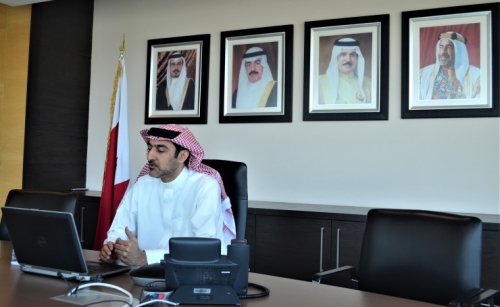Bahrain among first Arab countries to adopt latest National Frequency Plan
Manama
Information & eGovernment Authority (iGA) Chief Executive, Mohammed Ali Al Qaed chaired the 3rd Spectrum Strategy and Coordination Committee meeting, which was held remotely and attended by representatives of nine government organizations. The meeting discussed the latest developments related to the implementation of the National Frequency Plan.
Al Qaed emphasized that the committee is working to provide for the spectrum requirements of various sectors in support of the Government Action Plan. The updated National Frequency Plan, which is to be issued as a digital booklet, will allow for more effective use of the spectrum and resources. This, in turn, will help improve the quality of mobile and satellite communications and other radio services.
Al Qaed explained that the plan serves as a technical guide for radio-communications users in the Kingdom, including global manufacturers and developers of communications systems noting that since its plan announced in July 2020 Bahrain is noted to be among the first countries in the Arab World to adopt the plan, which reflects the outcome of the World Radio-communication Conference (WRC), held in Sharm el-Sheikh, Egypt in November 2019.
The digital booklet plan being issued by the Kingdom will serve as a reference for other countries, providing important information in a convenient and transparent manner. This is expected to help attract investment by showcasing the Kingdom’s clear and flexible radio-communications plans and regulations. An outline for the national dissemination of frequencies has been adopted and will be provided via the iGA corporate website and the National Portal, bahrain.bh.
The plan will serve a range of sectors in Bahrain, enabling them to access information quickly and easily
The committee discussed a number of other items, including a report by the Chairman of the Subcommittee for International Planning and the results of an Internet of Things (IoT) study conducted by the Telecommunications Regulatory Authority (TRA).
The National Frequency Plan allocates land, air, and maritime satellite spectrums locally in line with radio regulations issued by the International Telecommunications Union (ITU). It supports modern technologies and applications, meeting the requirements of the Kingdom’s telecommunications sector, including government, security, and private organizations, as well as individuals. The plan was reissued following the conclusion of the WRC, which is part of the ITU Radio-communications and is held every four years. Since 2015, the National Frequency Plan has been increasingly flexible, lifting restrictions relating to all frequency spectrums and providing them in a comprehensive way to users. They are distributed as per strategic plans adopted by the government which serves Information and Communication Technology (ICT) sector requirements.
The National Frequency Plan’s objectives include the introduction of more efficient technologies for users of the radio spectrum, meeting the requirements of the implemented national communications plan, and supporting the latest mobile and private communications technology advancements. This will help attract investment to the ICT sector, supporting economic growth. The plan also takes into account unified frequencies allocated regionally and globally for Public Protection and Disaster Relief (PPDR), which help local and international rescue and emergency teams communicate with each other.
Related Posts

